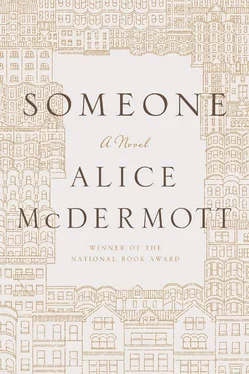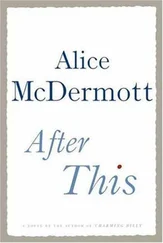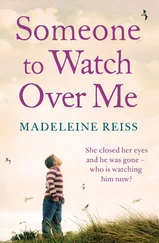It would only take a minute, I knew, to run down and tell them all that my mother had me inside baking bread. That I would be with them in forty minutes’ time, at most. But when I arrived at the stoop, the girls were all bent over their knees, laughing extravagantly into their laps and their hands. Gerty had just told a story, which she repeated for me, a story her father had told about a very drunk man who was throwing tomatoes at the door of a church, during a funeral no less. “What the devil’s gotten into you, man?” her father said. And the man, wound up like a pitcher on the mound, said to her father, “To hell with the devil,” and threw the tomato anyway.
Unless you count the absurdity of good little Gerty saying “hell” in a longshoreman’s gravelly voice, I was aware even then that the story wasn’t funny enough to merit the other girls’ mad laughter. That the laughter itself was meant mostly to get the boys in the street to glance over from their game. To get the boys to cry out, “Ah, shut up,” as they were doing now that Gerty’s second telling had the girls roaring once more. “Bunch of cackling hens,” the boys said to one another in their own fathers’ voices, even as the girls shook their heads, as their mothers would do, and pretended they hadn’t heard.
When the laughter had subsided and the boys turned back to their game, I announced that my mother had me trapped. “Time I learned something about cooking,” I repeated, which led Gerty to tell another funny story about how her aunty had recently tried to hide a pot of burned parsnips in the dumbwaiter. It was well known to us all by then that Gerty’s aunty hadn’t even known how to peel a potato when she first arrived from the other side to run the household.
“She still can’t poach an egg,” Gerty said with some haughtiness. “I’ve tried to show her a hundred times, but she just can’t learn.” She held up a finger, instructing all of us. “A touch of vinegar in the water does the trick.”
“Well, I don’t want to learn,” I said. “Once you learn to do it, you’ll be expected to do it,” and was amazed at the way my own words clarified for me what had been, until then, only a vague impulse to refuse. They looked at me over their knees, this gaggle of girls: a lifetime of hours in the kitchen bearing down on us all. “I’d rather be like your aunty.”
Gerty shook her head. “My dad says she’d burn water if she could.” And the girls laughed again, stamping their feet and slapping their knees. And the boys playing ball in the street looked over their shoulders to shout, “Be quiet, can’t you?” There would be no veering from that future.
I returned home with fifteen minutes on the clock still to spare. I opened the oven door and used the towel to take out the heavy bread. It was, I knew, paler than it should have been, but I turned off the oven anyway, simply to dispatch the task. I joined the girls again just as they were gathering themselves to leave the stoop and walk slowly down the street, pretending we only wanted to get a soda.
When I came home again, my father was at the dining-room table and my mother was bringing him his tea. My mother crooked her finger and led me into the kitchen, where the loaf, sitting on the cutting board, was darker than it had been. “What time did you take this out?” she asked, one eyebrow raised.
“When you told me to,” I said vaguely.
“It was hardly cooked,” she said.
I shrugged, indicating both that I could not be blamed and that it was all of no matter to me.
My mother sliced the rebaked bread and carried it in to my father where he sat at the cloth-covered table. I followed with the butter. Gabe’s place at the table was empty now. Now, after dinner, we listened to the radio.
The tea was poured. My father spread the butter on the thick slice of bread and winked at me before he took a bite. And then chewed, and then moved his mouth as if his tongue had been burned. He swallowed and took a drink of tea. My mother said, “Too much baking soda,” and placed her barely bitten piece of bread on her plate. And then put her hands in her lap, her back straight. “You must have added it twice,” she said, sternly enough to show that she understood this was sabotage. “I don’t know how I didn’t see it.”
I had added it, in fact, four times, with my back to my mother and my mother’s impatience—Glory be to God, read the recipe, Marie, how will you ever learn—making her, on three separate occasions, turn away.
“You’ll have to learn to pay more attention, Marie,” my mother was saying. “You’ll never learn to cook if you don’t pay attention. A kitchen can be a dangerous place if you don’t pay attention.”
“Oh, she’ll learn,” my father was saying, amused. “She’ll learn in good time.”
I bowed my head and studied my hands. I would not, I knew. I would not learn. Gerty Hanson had learned, but I would not.
I raised my eyes slowly, touching my glasses back onto my nose, well pleased with myself, but careful not to give this away. The day had grown cloudy and the dining room was dim. My father had returned the piece of bread to his plate, but as if to convey his sympathy, he still held the edge of it gently between his thumb and index finger—perhaps not wanting to hurt my feelings any further by letting go of it completely. His other three fingers, held delicately aloft, were trembling. His broad hand against the white cloth and the china plate was a color I had not expected: the gray fingernails sunk too deeply into the swollen yellow flesh. His flesh was swollen, thin as he was. I looked at his smiling face. Although we were only a few feet apart, across the familiar cloth at the familiar table, I felt my eyes strain, as they sometimes did when close things seemed suddenly to contract into a great distance. In my recollection, there was something of the smell of ether in the air.
That night, I found my mother sitting on my bed when I came out of the bathroom in my slippers and my robe. She asked me, “How are you?”
Surprised by her presence, I replied, “Fine, thank you, and yourself?” which was how she always answered when asked the same question by people on the street. Now she looked a little surprised. She said she was fine, thank you, as if by instinct alone. Her hands were in her lap. Her back was straight.
“Although,” she said, conversationally, as if we were indeed neighborhood ladies meeting on the street, “I’m a bit worried about your father.” She told me then that he was going to stop by the hospital tomorrow, to see if they couldn’t fix him up.
I said, with street decorum, “I’m sorry to hear that.”
I felt no threat from this news, blithe child that I was, because my thoughts were all on the strange sight of my mother sitting, idly, it seemed to me, on the edge of my bed. She came into my room often enough in those days, but always at a bustle, there to dust the furniture or mop the floor, to place clean clothes in my dresser or to turn the mattress or to scrub the bed frame with ammonia to ward off bedbugs. She came in to pull the blankets up over my shoulders every night, to kiss my forehead and remind me to say my prayers. Her stillness now, sitting here, her hands empty, made her presence particularly peculiar.
She asked me if I would like to come along with them to the hospital. I couldn’t go upstairs to see my father settle in, you had to be over sixteen to enter the wards, but I could go as far as the lobby.
I said that would be fine.
My mother said, looking into her hands. “In sickness and in health.” Then she raised her eyes to me, cautiously, it seemed. “That’s something you must repeat when you are married. When you make your marriage vows.”
I said, “I know.”
Читать дальше












